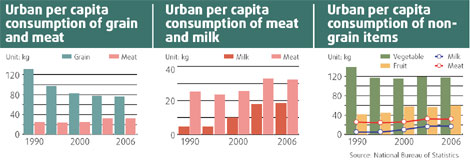

Self-reliance
While the Chinese people have consumed more grain consisting mostly of rice, wheat and corn, experts have said the country has remained more than 90 percent dependent on domestic supply these past years.
For the last five years, its dependence on domestic supplies has been above 95 percent, figures from the National Bureau of Statistics (NBS) have showed.
That means China relies on imports for only a fraction of its total grain consumption, no matter how much more it "eats", experts said.
As early as the 1980s, when the rural cottage industry started to flourish in China, Dwight Perkins, a Harvard professor on Chinese economy and agriculture, told his Chinese audience that the country could never afford to follow the development strategy of Japan and South Korea. Industry took off in both countries when the two countries' grain output declined, Perkins had maintained. In the end, it declined so much that both countries had to become net grain importers.
With its immense population and demand, China cannot afford a similar change, Perkins had said. The global grain market cannot afford to have such a large nation depend on it for most of its supplies, he told China Daily then.
In its pursuit of market-oriented reform, China has thus had no choice but to try and maintain a considerable level of self-reliance on grain, while introducing more market forces into its economy.